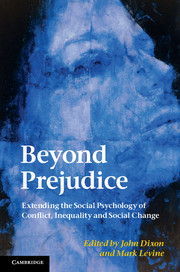Book contents
- Frontmatter
- Contents
- Figures
- Tables
- Contributors
- Acknowledgements
- Introduction
- Part I Beyond prejudice
- 1 From perception to mobilization: the shifting paradigm of prejudice
- 2 Prejudice, social identity and social change: resolving the Allportian problematic
- 3 An ambivalent alliance: hostile and benevolent sexism as complementary justifications for gender inequality
- 4 Prejudice and dehumanization
- 5 Stereotyping, prejudice and discrimination revisited
- 6 Beyond ‘old’ and ‘new’: for a social psychology of racism
- 7 The notion of ‘prejudice’: some rhetorical and ideological aspects
- 8 The prejudice problematic
- 9 Implicit prejudice in mind and interaction
- 10 Rethinking the prejudice problematic: a collaborative cognition approach
- Part II Prejudice and social change revisited
- Index
- References
10 - Rethinking the prejudice problematic: a collaborative cognition approach
from Part I - Beyond prejudice
Published online by Cambridge University Press: 05 June 2012
- Frontmatter
- Contents
- Figures
- Tables
- Contributors
- Acknowledgements
- Introduction
- Part I Beyond prejudice
- 1 From perception to mobilization: the shifting paradigm of prejudice
- 2 Prejudice, social identity and social change: resolving the Allportian problematic
- 3 An ambivalent alliance: hostile and benevolent sexism as complementary justifications for gender inequality
- 4 Prejudice and dehumanization
- 5 Stereotyping, prejudice and discrimination revisited
- 6 Beyond ‘old’ and ‘new’: for a social psychology of racism
- 7 The notion of ‘prejudice’: some rhetorical and ideological aspects
- 8 The prejudice problematic
- 9 Implicit prejudice in mind and interaction
- 10 Rethinking the prejudice problematic: a collaborative cognition approach
- Part II Prejudice and social change revisited
- Index
- References
Summary
Prejudice is understood as the human individuals’ psychological tendency to make unfavorable evaluations about members of other social groups.
Ibanez et al. (2009, p. 81)It blunts the thinking to speak of the participants in the social scene as ‘individuals’.
Asch (1952, p. 180)The vagueness of prejudice
As Pawlik and d’Ydewalle (2006) have noted, psychologists generally tend to refer to their research objects in common-language terminology. Consequently, authors of academic texts often start out by providing formal definitions of any key terms in order to establish a clear boundary between their own scientific understanding and the imprecise, inaccurate, forms of conceptualization typical of ‘mere’ common sense (cf. Billig, 1990; Shapin, 2001). Social psychological work on prejudice is, of course, no exception, and most authors offer their readers a definition of the term ‘prejudice’, which they typically distinguish from purportedly less accurate or precise everyday uses of the word.
- Type
- Chapter
- Information
- Beyond PrejudiceExtending the Social Psychology of Conflict, Inequality and Social Change, pp. 200 - 222Publisher: Cambridge University PressPrint publication year: 2012
References
- 15
- Cited by

